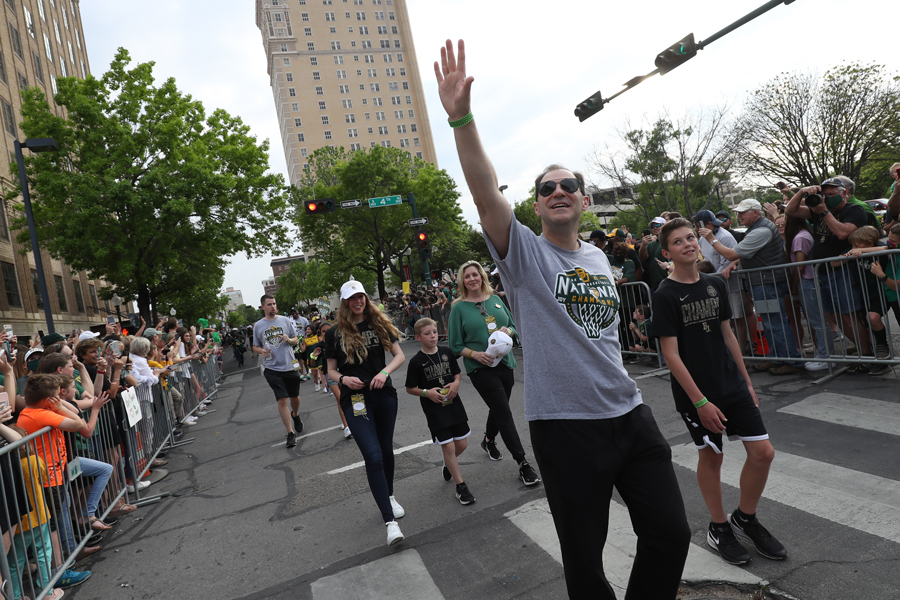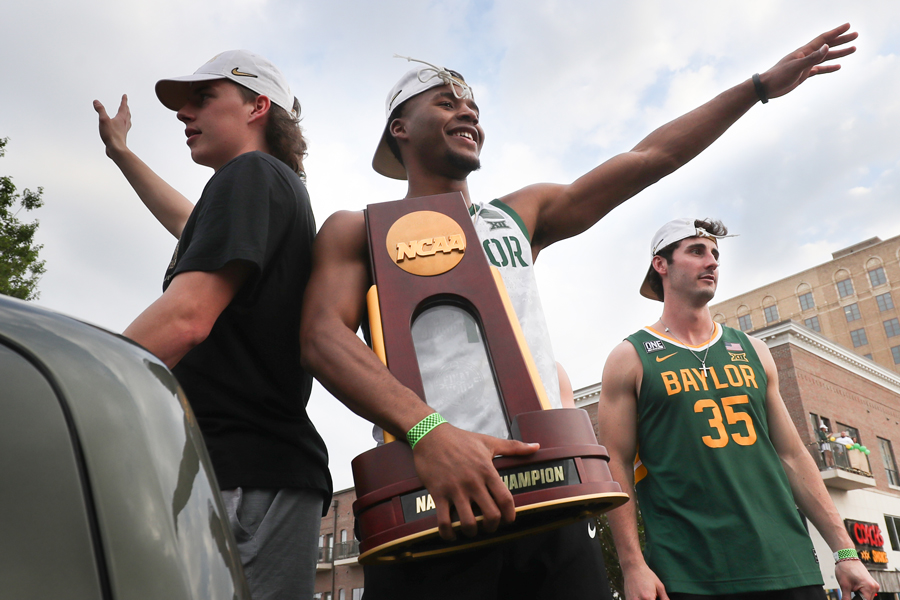National Champs!
Bears' national title was more improbable than most people realize
Most Baylor fans know the story of how Scott Drew, in his August 2003 introductory press conference as the University’s men’s basketball head coach, said he came to Baylor “for a chance to win a national championship.” It seemed improbable at the time given the state of the program, regardless of the events during the three months prior to Drew’s hiring.
Baylor appeared in four of the 65 NCAA Men’s Basketball Tournaments prior to Drew’s arrival, including one of the previous 53 tournaments. The program was rarely mentioned as a contender to play in the NCAA Tournament, let alone win it.
Nearly two decades later, Drew’s words proved prophetic as the Bears dismantled top-ranked and previously unbeaten Gonzaga University, 86-70, in the 2021 national title game. It was the perfect ending to a 28-2 season that also saw Baylor claim its first conference title in 71 years.
“First and foremost, I want to thank God for blessing us with this opportunity tonight,” Drew said after the national title game. “The guys worked really hard, and I’m so happy they get a chance to celebrate now.”
Baylor’s men’s basketball program endured decades of mediocrity, but this was not the Bears’ first appearance in the national championship game. However, no one directly associated with the 2020-2021 squad (players, coaches, support staff) was alive when Baylor lost to Adolph Rupp’s University of Kentucky squad in the 1948 title tilt. Nonetheless, Baylor’s 73 years is the second-longest stretch between title game appearances behind only the University of Wisconsin’s 74 years (1941-2015).
“As a coach, you never know when you’re going to be able to get to a Final Four, a national championship, so you want to take advantage of those opportunities,” Drew said. “Really blessed that we were able to get to a Final Four and win a national championship because it’s hard to do.”
Exactly how hard? When looking through the lens of Baylor’s demographic in the landscape of NCAA men’s basketball, really hard.
This year’s was the 83rd NCAA Men’s Basketball Tournament. In that time, 11 private schools (of which eight are faith-based institutions) have won 18 national titles. That means 21.7 percent of the titles were won by private universities, which currently make up 32.5 percent of the Division I men’s basketball programs (116 of 357).
Duke University (six), the University of San Francisco (two) and Villanova University (two) are the only private schools with multiple titles. The other private institution winners are Baylor, Georgetown University, College of the Holy Cross, La Salle University, Loyola University Chicago, Marquette University, Stanford University and Syracuse University.
Readers may notice a similarity with most of those schools: All are located in major (top 40) U.S. media markets except Baylor (83rd) and Syracuse (87th). Given the prominence of Syracuse broadcast and digital journalism alumni in sports media, it could be argued that the school’s position on the U.S. media markets list is moot.
Baylor’s national title is more improbable when looking through the lens of Metropolitan Statistical Areas (MSAs) as defined by the U.S. Census Bureau. Waco is the nation’s 177th-largest MSA (273,920 residents according to 2019 estimates) with Duke’s location of Durham, North Carolina, being the next smallest (92nd) among private institutions that have won men’s basketball titles (Syracuse, New York, ranks 90th).
In fact, only four public universities located in MSAs smaller than Waco have won men’s basketball titles: Indiana University in Bloomington (253rd), the University of Kansas in Lawrence (326th), the University of Wyoming in Laramie (358th) and Oklahoma State University in Stillwater, which is a Micropolitan Statistical Area according to the Census Bureau. Gainesville, Florida, is the next smallest MSA (329,128 residents; 154th) with a men’s basketball national championship winner (University of Florida).
Wyoming won the title in 1943, and Oklahoma State won titles in 1945 and 1946 when the school was known as Oklahoma A&M. Furthermore, Bloomington is part of the Indianapolis media market (25th) and Lawrence is part of the Kansas City media market (34th).
Therefore, when looking at the world of Division I men’s basketball through Baylor’s demographic lens (private institution located in a non-major media market with a metropolitan area of fewer than 325,000 residents), the Bears’ national title was highly improbable, and it is truly unique.

